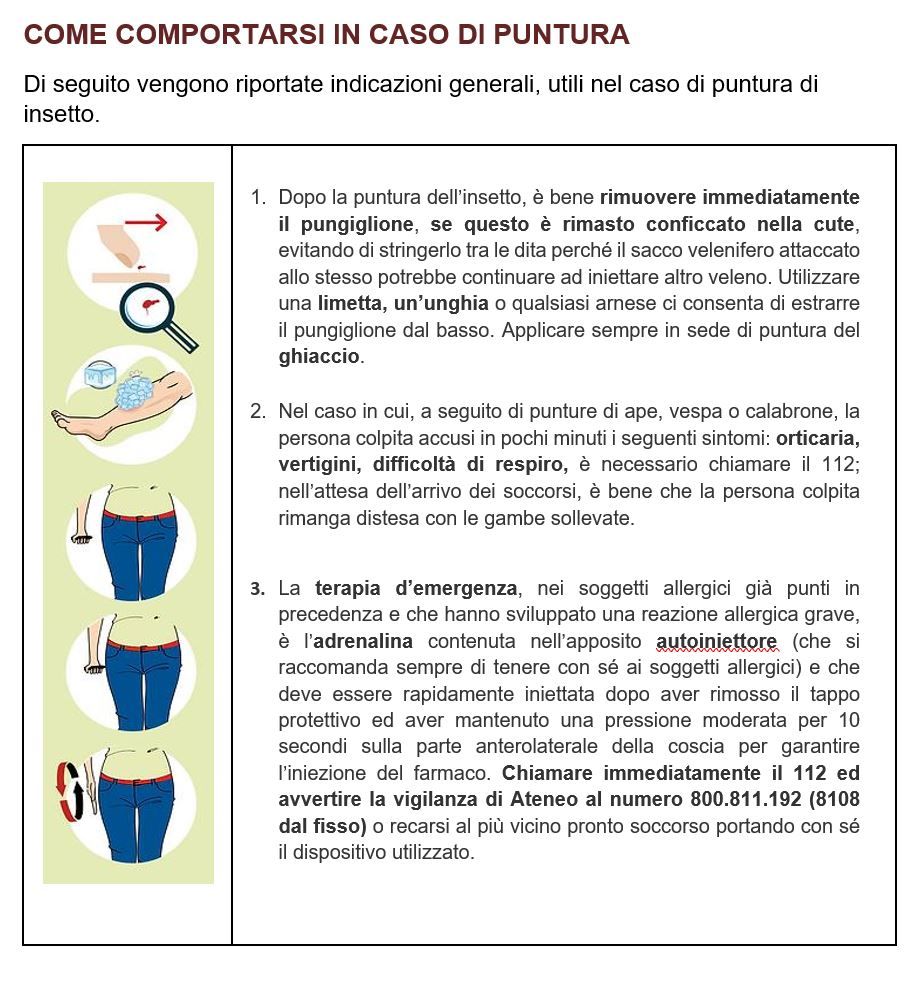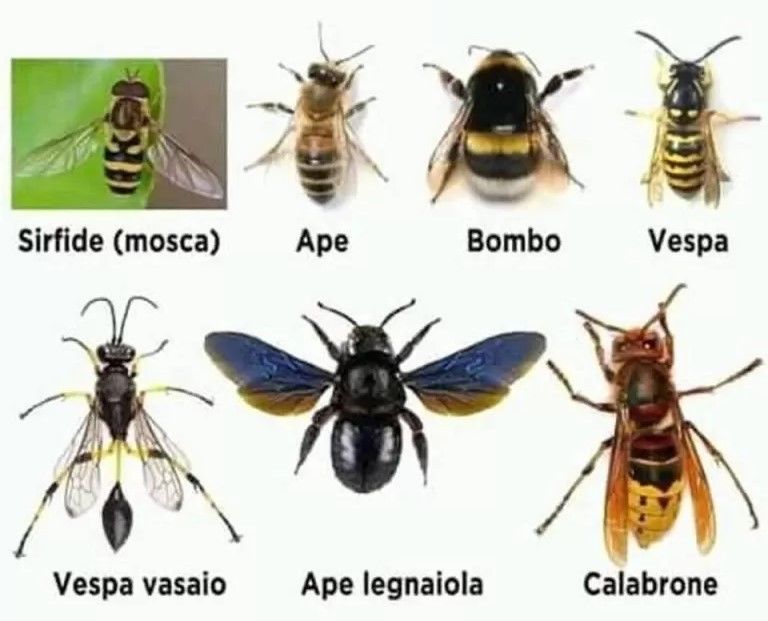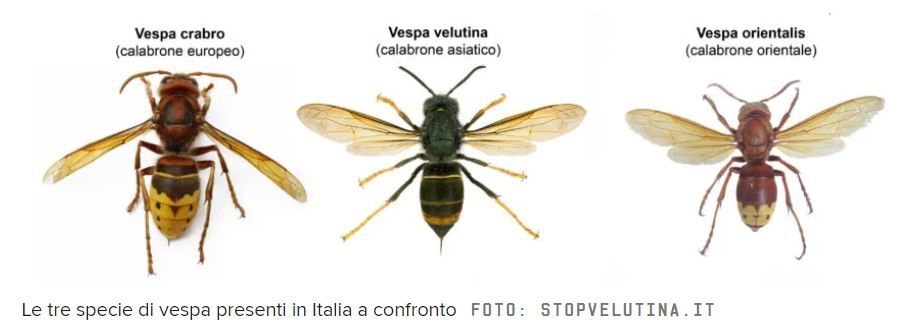Invasive animal species on Sapienza premises - P020_C
The following are the indications to be applied when an infestation by invasive animal species is identified.
MAIN PEST SPECIES
- Flying insects (e.g. wasp, bee, hornet)
- Crawling insects (e.g. cockroaches)
- Rodents (e.g. rats or mice)
The presence of these species is more common in workplaces that are seldom visited, that have been closed for a long time, and where there are false ceilings, service ducts and pipes, crawl spaces, etc.
The infestation of invasive animal species is facilitated by the poor hygiene of places and spaces and by the existence of stocks of disused goods, obsolete equipment and waste awaiting disposal.
RISKS TO HUMANS
Pest species pose a health risk to humans as they carry a variety of pathogens that can be transmitted to humans.
Flying insects (e.g. Hymenoptera) can pose an additional health risk due to a very painful sting, with the possibility of anaphylactic effects in allergic individuals (5-10 stings can be fatal, e.g. Vespa crabro or Vespa velutina).
Rodents and mice can be vectors and reservoirs of certain diseases, including toxoplasmosis, leptospirosis, plague and salmonellosis, as well as others not mentioned because they are less common.
Crawling insects, among which we find spiders, mites, scorpions, etc., some although not belonging to the insect family, are commonly included among crawling insects.
As for spiders, the type found in Italy is mostly non-poisonous. Moreover, a spider bite is not always poisonous, which is why there are few cases to worry about. Usually following a spider bite, swelling, redness and pain appear in the affected area after about two hours. In rare cases involving larger wounds that may give rise to allergic reactions, medical attention should be sought.
In the case of scorpions, the danger lies in the sting through which they can inject their venom. Scorpion venom contains neurotoxins and chemicals that can potentially affect the nervous system and create paralysis. The venom of scorpions present in Italy poses no particular risk to human health as it is mildly toxic.
INFORMATION ON FLYING INSECTS
In view of the current spread of the eastern hornet (Vespa orientalis Linnaeus), a specific information sheet is available by clicking here (in Italian).
WHAT TO DO IN THE PRESENCE OF FLYING INSECTS
In the event of the confirmed or suspected presence of flying insects, a few simple precautions should be followed:
- in the event of contact with aggressive flying insects, remain calm and, if possible, immobile;
- never use insecticides for mosquitoes or other insects as their action is slow and some hymenoptera manage to sting anyone in the vicinity before dying;
- use caution when working in at-risk areas (outdoors, in places that have not been frequented for a long time or that have areas of possible interest for nests);
- have environmental remediation carried out by experienced personnel.
If you are outdoors, you should also take the following general precautions:
- cover food and drinks;
- do not leave open bottles or cans that can be reached by bumblebees, and do not drink directly from cans left open unattended;
- seal waste;
- avoid using perfume, hairspray or creams;
- avoid wearing loose, dark-coloured, garish or floral-patterned clothing;
- beware of any nests in trees, on the ground or in crevices in general.
WHAT TO DO IN THE EVENT OF A FLYING INSECT BITE
The following are general tips that are useful in the event of an insect bite.
1. After an insect bite, it is a good idea to remove the stinger immediately, if it is stuck in the skin, avoiding squeezing it between your fingers because the venom sac attached to it could continue to inject more venom. Use a nail file, fingernail or any tool that allows us to extract the stinger from below. Always apply ice to the sting site.
2. If, following an insect sting, in particular a bee, wasp or hornet sting, the affected person experiences the following symptoms within a few minutes: hives, dizziness, difficulty breathing, it is necessary to call 112; while waiting for help to arrive, it is a good idea for the person affected to lie down with their legs raised.
3. The emergency treatment, in allergy sufferers who have been stung before and have developed a severe allergic reaction, is the adrenaline contained in the special auto-injector (which it is always recommended that allergy sufferers carry with them), which must be quickly injected after removing the protective cap and maintaining moderate pressure for 10 seconds on the anterolateral part of the thigh to ensure the injection of the drug. Immediately call 112 and alert Sapienza Security at 800.811.192 (8108 from a landline) or go to the nearest emergency room carrying the device used.
WHAT TO DO IN THE PRESENCE OF NESTS OR SUSPECTED NESTS
In the event of the discovery of a nest or larvae, or in the event of the conspicuous and abnormal presence of flying insects near or within Sapienza premises, each person is advised to:
- immediately move away from the area where the nest is located or where larvae or flying insects are present;
- Immediately contact their supervisor or alternatively the local security contact person;
- Send an email containing the necessary indications to identify the area affected by the problem, to the following addresses:
To: Paolo.Grottesi@uniroma1.it;
cc:
- Direzione.age@uniroma1.it;
- Sandro.Mauceri@uniroma1.it,
- Ufficiosecurity.aos@uniroma1.it,
- Uspp@uniroma1.it,
- Altavigilanza.ssl@uniroma1.it;
- for outdoor areas, alert Sapienza's Security Service on the emergency number 800. 811.192;
- do not intervene with do-it-yourself techniques and scrupulously follow the instructions received (as indicated above)
- wait for the intervention of specialised companies, appointed by the Building Maintenance Area, for the removal and reclamation;
- the Employer in charge of the premises concerned is obliged, where there are obvious dangers, to prohibit access until the spaces concerned have been made safe, where necessary with the cooperation of Sapienza's Security Service.
INDICATIONS CONCERNING CRAWLING INSECTS
Here are some useful tips on what to do in the event that crawling insect nests are found in the University.
WHAT TO DO IF YOU SPOT CRAWLING INSECT NESTS AT SAPIENZA
In the event of the discovery of insect nests or the conspicuous and abnormal presence of any type of insect in the Sapienza premises, each person is advised to:
- Immediately contact their supervisor or, alternatively, the local security contact person, and immediately report any damage to electrical components caused by rodents;
- send an e-mail with the necessary information to identify the area affected by the problem to the following addresses:
- do not intervene with do-it-yourself techniques and scrupulously follow the instructions received from the Employer, Manager or Person in charge, or from the Building Maintenance Area;
- wait for the intervention of specialised companies.
RODENT-RELATED INDICATIONS
The management of rodent infestations is particularly complex, and requires interventions specifically designed for each situation and logistical configuration of infested spaces. The Building Maintenance Area, through a specialised company, analyses cases of infestation and identifies the most suitable solutions to combat the presence of rodents.
WHAT TO DO IF RODENTS ARE FOUND
In the event of the ascertained or suspected presence of rodents, or if damage to electrical components by rodents is detected near or inside Sapienza premises, each user is advised to:
- immediately contact their supervisor or, alternatively, the local security contact person, also promptly reporting any damage to electrical components by rodents;
- send an email containing the necessary indications to identify the area affected by the problem, to the following addresses:
- do not intervene with do-it-yourself techniques and scrupulously follow the instructions received from the Employer, Manager or Person in charge, or from the Building Maintenance Area;
- wait for the intervention of specialised companies appointed by the Building Maintenance Area.
P020_C REV. 01 DEL 14.09.2023






